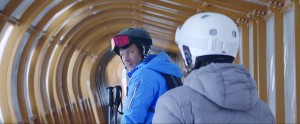Force Majeure
Force Majeure, 2014, 2 stars
Inferior force
Force Majeure’s tedium outweighs its profundity
From The Orlando Weekly, December 17, 2014
Despite our culture’s move toward gender equality over the last 100 years, there remain hard-wired differences between the sexes that are difficult to ignore. Husbands still long to protect their wives from danger, while women gain comfort by knowing they have a loyal partner to help keep the family safe. Take away those roles, and relationships are often turned upside down.
Though an analysis of gender psychology is slightly above the pay grade of this critic, it’s nevertheless a good starting point for discussion of Force Majeure, writer-director Ruben Östlund’s insightful yet ponderous study of a family’s slow disintegration at the hands of sudden disappointment and broken trust. Because it spends almost two hours dwelling on a single, brief event, the film has a lot in common with other obsession films, such as The Conversation and even the lesser-known Nancy, Please, all of which urge its audience to yell at the screen, “Move on with your life!” But because the events of Force Majeure speak to the very nature of human bonding, it’s not quite that easy.
While on a ski vacation in the French Alps, a Swedish couple and their two young children witness a controlled avalanche that gets slightly out of hand. Though they were never in any true peril, their reactions to and subsequent discussions of the perceived danger threaten to set their marriage adrift in a snowbank, both literally and figuratively. It’s safe to say that if you ever considered a romantic alpine getaway with your partner, you might want to skip this film.
“You ran away from me and the kids,” Ebba (Lisa Loven Kongsli), the wife, accuses her husband, Tomas (Johannes Kuhnke), both privately and to friends who join them on the vacation. Struggling with an explanation for Tomas’s behavior, all that their friend can come up with to soothe the situation is, “It’s a primitive force to just escape.” That’s little solace for Ebba, or for Tomas, who is both confused and ashamed by his wife’s accusations.
Plot is left to a minimum in this Swedish-French-English production. Heck, it’s almost totally abandoned in favor of an overwhelming subtlety and emptiness that, when combined with the majestic vistas (captured spectacularly by cinematographer Fredrik Wenzel), are meant to elicit wonder, both at the scenery and the humanity so nakedly on display. Yet Östlund spends so much time milking a solitary moment and burying everything else under a mountain of tedium, pretention and, frankly, boredom that the emotional impact and humor that some of my fellow critics have apparently found is dulled to a fine powder.
“I’m a bloody victim of my own instincts,” Tomas laments. That astute observation does add to the movie’s profundity, but because everything could have been captured more successfully in a short film of, say, 30 minutes, Force Majeure fails to live up to its title. Regrettably, it is no superior force, but is instead relegated to its alternate meaning: an unavoidable accident.
© 2014 Orlando Weekly / MeierMovies, LLC
